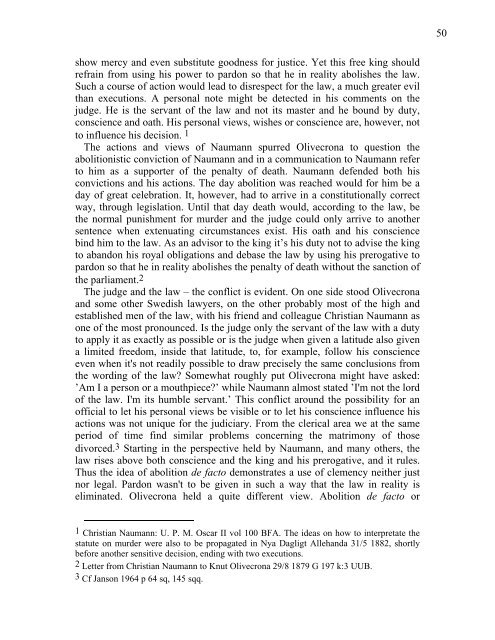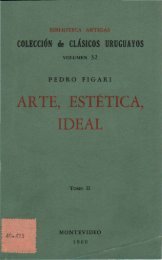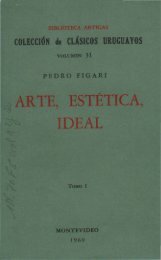Knut Olivecrona and his ”Om dödsstraffet”. - Figuras
Knut Olivecrona and his ”Om dödsstraffet”. - Figuras
Knut Olivecrona and his ”Om dödsstraffet”. - Figuras
You also want an ePaper? Increase the reach of your titles
YUMPU automatically turns print PDFs into web optimized ePapers that Google loves.
show mercy <strong>and</strong> even substitute goodness for justice. Yet t<strong>his</strong> free king should<br />
refrain from using <strong>his</strong> power to pardon so that he in reality abolishes the law.<br />
Such a course of action would lead to disrespect for the law, a much greater evil<br />
than executions. A personal note might be detected in <strong>his</strong> comments on the<br />
judge. He is the servant of the law <strong>and</strong> not its master <strong>and</strong> he bound by duty,<br />
conscience <strong>and</strong> oath. His personal views, wishes or conscience are, however, not<br />
to influence <strong>his</strong> decision. 1<br />
The actions <strong>and</strong> views of Naumann spurred <strong>Olivecrona</strong> to question the<br />
abolitionistic conviction of Naumann <strong>and</strong> in a communication to Naumann refer<br />
to him as a supporter of the penalty of death. Naumann defended both <strong>his</strong><br />
convictions <strong>and</strong> <strong>his</strong> actions. The day abolition was reached would for him be a<br />
day of great celebration. It, however, had to arrive in a constitutionally correct<br />
way, through legislation. Until that day death would, according to the law, be<br />
the normal punishment for murder <strong>and</strong> the judge could only arrive to another<br />
sentence when extenuating circumstances exist. His oath <strong>and</strong> <strong>his</strong> conscience<br />
bind him to the law. As an advisor to the king it’s <strong>his</strong> duty not to advise the king<br />
to ab<strong>and</strong>on <strong>his</strong> royal obligations <strong>and</strong> debase the law by using <strong>his</strong> prerogative to<br />
pardon so that he in reality abolishes the penalty of death without the sanction of<br />
the parliament.2<br />
The judge <strong>and</strong> the law – the conflict is evident. On one side stood <strong>Olivecrona</strong><br />
<strong>and</strong> some other Swedish lawyers, on the other probably most of the high <strong>and</strong><br />
established men of the law, with <strong>his</strong> friend <strong>and</strong> colleague Christian Naumann as<br />
one of the most pronounced. Is the judge only the servant of the law with a duty<br />
to apply it as exactly as possible or is the judge when given a latitude also given<br />
a limited freedom, inside that latitude, to, for example, follow <strong>his</strong> conscience<br />
even when it's not readily possible to draw precisely the same conclusions from<br />
the wording of the law? Somewhat roughly put <strong>Olivecrona</strong> might have asked:<br />
’Am I a person or a mouthpiece?’ while Naumann almost stated ’I'm not the lord<br />
of the law. I'm its humble servant.’ T<strong>his</strong> conflict around the possibility for an<br />
official to let <strong>his</strong> personal views be visible or to let <strong>his</strong> conscience influence <strong>his</strong><br />
actions was not unique for the judiciary. From the clerical area we at the same<br />
period of time find similar problems concerning the matrimony of those<br />
divorced.3 Starting in the perspective held by Naumann, <strong>and</strong> many others, the<br />
law rises above both conscience <strong>and</strong> the king <strong>and</strong> <strong>his</strong> prerogative, <strong>and</strong> it rules.<br />
Thus the idea of abolition de facto demonstrates a use of clemency neither just<br />
nor legal. Pardon wasn't to be given in such a way that the law in reality is<br />
eliminated. <strong>Olivecrona</strong> held a quite different view. Abolition de facto or<br />
1 Christian Naumann: U. P. M. Oscar II vol 100 BFA. The ideas on how to interpretate the<br />
statute on murder were also to be propagated in Nya Dagligt Alleh<strong>and</strong>a 31/5 1882, shortly<br />
before another sensitive decision, ending with two executions.<br />
2 Letter from Christian Naumann to <strong>Knut</strong> <strong>Olivecrona</strong> 29/8 1879 G 197 k:3 UUB.<br />
3 Cf Janson 1964 p 64 sq, 145 sqq.<br />
50






